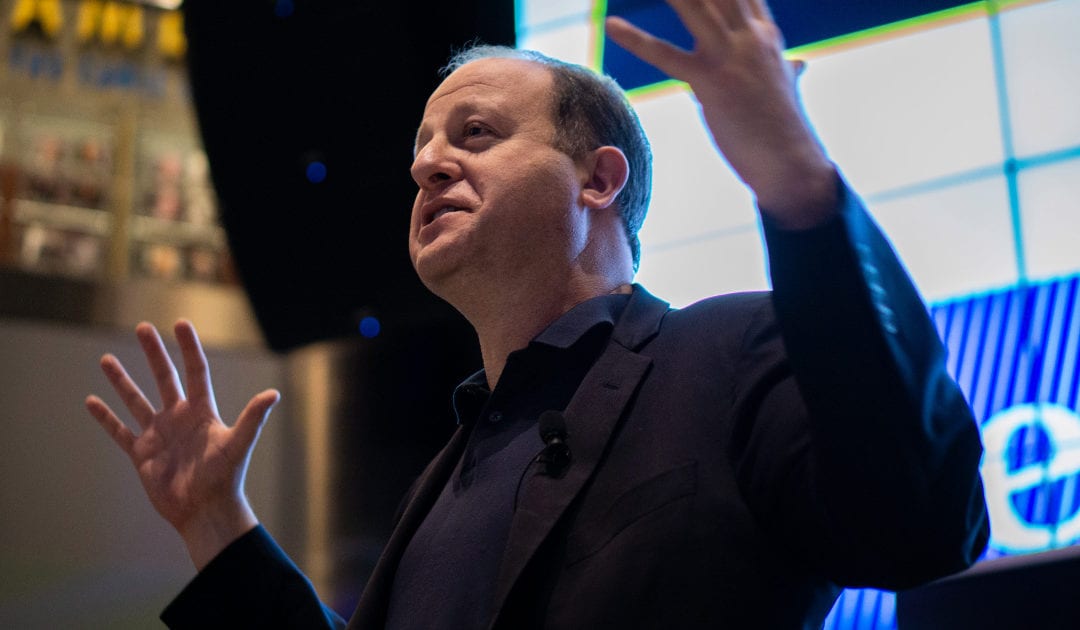
To deliver on his campaign promises and policy priorities, Colorado Gov. Jared Polis is relying on wealthy donors and major advocacy organizations to pay the bill.
The Democratic governor is accepting more than $1 million from donors, nonprofits and foundations to pay salaries and costs associated with six top policy positions, according to a review of financial records and other documents by The Colorado Sun in partnership with CBS4 Denver.
OUR UNDERWRITERS SUPPORT JOURNALISM. BECOME ONE.
The governor’s special adviser on climate change — tasked with moving Colorado to 100% renewable energy and hitting pollution reduction targets — is funded through the U.S. Climate Alliance with money from a foundation backed by the grandson of Walmart’s founder.
His special adviser on immigrants and refugees is paid with money from the Emerson Collective, a social impact firm led by the widow of Apple co-founder Steve Jobs.
The office’s special adviser on early childhood is funded by two other foundations that are leading advocates on the issue.
The three other donor-backed positions focus on economic stability, an aging population and people with disabilities, and additional donations pay for various projects and initiatives.
Taken together, private dollars are driving many of the Polis administration’s top priorities in the first 18 months of his term — all without disclosure to the public until now.
The donations operate outside the state budget with limited oversight and transparency, and continue a pattern from previous governors. At least three of the grants accepted by the governor’s office include confidentiality clauses that limit the information available, according to documents obtained by The Sun. And four donors funneled money for the grants through other organizations, hiding the true source.
The benefit to the governor’s office from such arrangements is easy to see: Polis gets money to hire an additional staffer who can help him reach the lofty goals he set in his campaign. And it comes without the scrutiny of Colorado lawmakers through the state budget process nor the political baggage from expanding the size of government.
Similarly, the advantages for donors are apparent: The money allows the advocates to give their issues a higher priority in the administration through a position that advises the governor.
“That’s sort of the quid pro quo of philanthropy, and society is ultimately the winner,” said Bruce DeBoskey, a philanthropic strategist in Denver.
He added: “There’s nothing wrong with it inherently, in my view. But it needs transparency, so there is also accountability.”
To critics, the practice represents government-for-hire, and the donor-funded initiatives are ripe for potential conflicts of interest. “The practice of allowing private interests to pay their way into positions of authority in state government offices does not serve the public interest,” Tiger Joyce, the president of the American Tort Reform Association, said in a statement.
Both Democratic and Republican lawmakers tell The Sun that the donations need more scrutiny. The bipartisan legislative budget committee is considering legislation to force more disclosure from the administration, a move that came in part from earlier reports by The Sun and CBS4 about spending in the governor’s office.
“The governor’s office has pretty wide latitude on where they can accept money from,” said Sen. Dominick Moreno, a Commerce City Democrat and top legislative budget writer, in a recent interview. “These are funds the Joint Budget Committee has no discretion or appropriation authority over, and it is something that has caught our attention and something that is concerning.”
Polis declined repeated requests to discuss how his office is funded. But a spokesman defended the administration’s practice, pointing to state law that allows the office to accept gifts, grants and donations to fund its operations. In a statement, the administration rejected any concerns about possible conflicts and said the private money is needed for key projects.
“The grants the administration has received help expand capacity in the governor’s office,” spokesman Conor Cahill wrote in response to questions from The Sun. “Without this funding, the governor’s office would have less capacity for policies and issues important to Coloradans, like investing in early childhood education, addressing the economic and moral threat of climate change, ensuring seniors can retire with dignity and have access to critical resources and supporting the Colorado immigrant community.”
Polis accepting outside money even after pleading independence from wealthy donors in campaign
Private dollars have flowed to the governor’s office for decades, but Polis’ embrace of the arrangement is particularly notable.
In his 2018 campaign, the wealthy technology entrepreneur and former congressman spent more than $23 million from his own pocket and limited campaign donations to $200 — all to demonstrate he wouldn’t be beholden to powerful special interests.
His predecessor, former Gov. John Hickenlooper, accepted millions of dollars from corporations, nonprofits and foundations, an earlier investigation by The Sun and CBS4 found, and served as a cheerleader for private industry partnerships with government. Hickenlooper has since acknowledged that the limited disclosure and guardrails regarding potential conflicts created a perception problem.

Other Colorado governors accepted outside money to pay for positions in their offices. Democratic Gov. Roy Romer, a three-term governor first elected in 1986, used private dollars to fund his early childhood initiative. Republican Gov. Bill Owens and Democratic Gov. Bill Ritter similarly tapped foundations for positions, according to former aides. The handful of privately-funded positions in Polis’ administration is on par with Ritter and Hickenlooper.
“There wasn’t any controversy about those conflicts of interests,” said Jim Carpenter, a former chief of staff in the Romer and Ritter administrations. “We were very careful about all those things.”
The ability for private entities to fund key positions is part of a larger national trend. “What we’ve seen is a rise of the influence of philanthropy in a whole number of areas that affect policy,” said DeBoskey, who leads the DeBoskey Group consulting firm. In some cases, he added, “high net worth donors are using their philanthropy as a tool to create opportunity and … influence public policy.”
MORE: Oil and gas and private donors paid for initiatives in Hickenlooper’s administration, investigation finds
And the pattern is drawing more scrutiny. A report from an affiliate of the National Association of Manufacturers found the practice prevalent in attorneys general offices. Phil Goldberg, a special counsel to the group, said he’s not surprised that it’s expanding to other agencies. “The concern is clearly that these government offices are starting to look for outside funding — private funding — to advance their agendas,” he said. “So it really raises the question of whether outside groups, through subsidizing government offices, can drive their agendas through the name of the government.”
Colorado Attorney General Phil Weiser is not accepting outside money for positions in his office. In his 2018 campaign, he questioned the idea when asked about accepting a fellow for climate-based litigation funded by billionaire and former New York Mayor Michael Bloomberg. A spokesman for Weiser said the office only accepts new graduates for fellowships funded by law schools.
The Polis administration is drawing a line when it comes to donations to his office, refraining from accepting direct donations from corporations — a reversal from the controversial practice of the Hickenlooper administration, which took money from the oil and gas industry and others.
Polis’ office has accepted some donations from companies, but a spokesman said they originated under the prior administration. And while Polis believes Hickenlooper’s community partnerships were “worthy efforts,” Cahill said the current governor is “focused on transformal change through policy work.”
“Governor Polis did make a deliberate change in his own office limiting gifts, grants and donations into the governor’s office to nonprofits and foundations,” Cahill said.
But even as Polis shuns corporate money, companies or wealthy business leaders donate to some of the foundations that gave his office money. In certain cases, those donors work on issues regulated by the administration.
The grants to the governor’s office come with strings attached
Polis inherited at least two privately funded positions from Hickenlooper.
The first was a coordinator for a two-generation economic security program that ended in 2019 and included a $20,000 donation from the Zoma Foundation as well as funding from a handful of other nonprofits. The Denver-based foundation is connected to Ben Walton, a grandson of Walmart founder Sam Walton who also leads Zoma Capital, a global investment firm focused on energy and water.
The second is a senior adviser on aging funded by the NextFifty Initiative, a private foundation focused on the older adult population. The post started in 2017 and the final payment for the $150,000-a-year grant is expected later this year.
Diana McFail, the initiative’s president and CEO, said aging is not a topic that gets a lot of attention, and often resources are diverted to children and other areas. She believes the government should pay for the role and put “skin in the game,” but until then, the grant fills the gap. The position, she said, gives the issue “a broader viewer and greater reach and closer proximity to policymakers and lawmakers.”
Each grant is different, but the governor’s office is typically approached with an offer from a foundation to provide money for a project and then submits a formal application outlining its goals. In some cases, the grants are awarded after a competitive process.
In documents reviewed by The Sun, the governor’s office often signed a contract that included certain benchmarks it must meet to receive additional payments. Typically, the funder required regular progress reports and the ability to consult with the person in the position and make suggestions.
The governor’s office said it retains full discretion over the work and the person hired, and argued that the requirements in the grants were guidelines. “Other than setting the general parameters for how the money can be used, the donor has no influence over who the staff person is, what the staff person works on, how they go about their work or how they advise or represent the governor,” Cahill said.
But outside observers suggest the money is a lever to influence decision-makers. “These arrangements put government employees in a position in which they are serving two masters – and one will always win out,” said Joyce at the tort reform association, which compiled national data on private funding of government positions in a 2019 report. The report looked at money from the U.S. Climate Alliance but it was published before Colorado received its grant.
No specific conflict-of-interest policy exists to govern how the administration handles such grants. But the governor’s spokesman pointed to a state law prohibiting state employees from engaging in activities that create a conflict of interest and noted that senior staffers are subject to an ethics policy and attend training.

A state transparency database obscures donations to governor’s office
Moreover, the practice of accepting private donations is transparent because the grants are listed on a state website “for all to see,” a Polis spokesman said.
But that’s not the case. In most instances, The Sun discovered, the foundations identified as the donors to the governor’s office merely acted as intermediaries and the actual source of the money is not disclosed.
In addition, the publicly available data in the state’s transparency database is so limited and difficult to find that it’s impossible to know who is providing money to the governor’s office and the reason.
One example of the lack of disclosure is a grant listed from the Silicon Valley Community Foundation. The state’s database offers no details about its purpose.
Asked about the purpose for the donation, the governor’s office said it was part of a $270,000 two-year grant to cover the salaries and costs of the governor’s special adviser on new American integration.
Polis announced the new position in November 2019 and hired Kit Taintor, an official from Hickenlooper’s administration, to identify gaps in services and support for refugees and immigrants living in the country illegally. But he didn’t disclose the benefactor.
The California-based foundation told The Sun it served as a pass-through for a different donor that it refused to identify. The governor’s office initially declined to answer a question about whether it knew the donor, but pressed again, a spokesman said the money came from Emerson Collective, the firm led by Laurene Powell Jobs, whom Forbes lists as the 59th richest person in the world.
Her social change organization is a leading advocate for immigrants, in particular children in the Deferred Action for Childhood Arrivals, or DACA, program. The collective identified governors who shared an interest in the issues, and invited Polis’ office to apply for the competitive grant, a foundation spokeswoman said. Colorado is one of four states to receive money so far. Under the terms, a third year of funding at $135,000 is possible if the governor’s office meets the agreed-upon goals, which were not specified in the documents obtained by The Sun.
“Governor Polis’ commitment to advocating for all residents, including immigrants, is impressive, which is why we are proud to support the state’s efforts,” Anya McMurray, a senior director at the Emerson Collective who leads the project, said in a statement.

Another donation to the governor’s office listed in the state database came from the United Nations Foundation, but again, the public records don’t list a purpose. The governor’s office later said the $252,000 two-year grant pays for the office’s special adviser on climate and energy.
But the United Nations Foundation — an organization backed by Ted Turner, the billionaire CNN founder and an environmental advocate — told The Sun the money actually came through an affiliated organization, the U.S. Climate Alliance. The alliance refused to identify the donor.
Asked whether the governor knew the source of the money, a Polis spokesman acknowledged it was the Catena Foundation, a Carbondale-based nonprofit funded by Sam R. Walton, another grandson of the Walmart founder.
Colorado was the first state to get a grant through the alliance, a bipartisan group of 25 states that committed to reducing greenhouse gases and meeting the terms of the Paris climate agreement. Clare Bastable, the Catena Foundation’s director, said her organization provided money for the alliance’s climate leadership program, but the states received the grants through a competitive process outside the foundation’s control.
Under the grant terms, the position is tasked with more than a dozen goals, including ensuring “meaningful progress” toward the governor’s 100% renewable energy by 2040 goal and keeping the state on track to hit the greenhouse gas reduction targets outlined in a 2019 bill signed by Polis.
The special climate adviser post is held by Zach Pierce, a former Sierra Club “Beyond Coal” campaign leader, who moved into the new role in January 2020 from an existing position. The second installment of the grant — another $126,000 — is dependent on satisfying the agreement’s terms, and so far, the state is moving slowly on the issue. It’s not yet clear which donor will cover the cost for the second year, the alliance said.
Julie Cerqueira, the alliance’s executive director, said the member states set the policy objectives and dismissed criticism that the alliance is pushing an agenda. “It’s a little bit absurd to think that we have that kind of influence with them,” she said.
She added: “Everything we do is at the request of the states.”
Two other grants to the governor’s were passed through organizations in a similar fashion, according to documents obtained by The Sun.
A $50,000 one-time donation listed from the nonprofit Telluride Foundation to support a statewide disability coordinator position in the lieutenant governor’s office actually came from the Saul Zaentz Charitable Foundation, which is managed by attorney and investor Elliot G. Steinberg.
The National Governors Association is listed as the source for a one-time $25,000 grant to support Polis’ special adviser on early childhood, but the source for the money was from the J.B. and M.K. Pritzker Family Foundation. Its leader, Illinois Democratic Gov. J.B. Pritzker, is a billionaire whose family owns the Hyatt hotel chain.

The Denver-based Buell Foundation donated the money for the early childhood position — a $150,000-a-year contract for three years that covers the salary, benefits and related costs.
Susan Steele, the president and CEO of the Buell Foundation, a leading advocate on early childhood in Colorado, said she had no idea her group could pay for a position until another organization mentioned their donations. “The idea was to build on Gov. Polis’ big interest in early childhood,” she said. “There was a real obvious connection — and we wanted to support the governor’s interest.”
Polis made providing state-funded full-day kindergarten his top priority in his first year in office and pledged in his campaign to provide universal preschool free to parents within two years.
When the foundation offered money to the governor’s office for the position, “They said, ‘Most definitely, yes,’” Steele said.
The governor picked Scott Groginsky, his former aide from his time on the state Board of Education nearly two decades ago. The office consulted with Steele on the appointment, she said.
Steele said she was surprised the process wasn’t more complicated. “I didn’t actually realize that to give a grant (to government) could be a simple operation,” she said.
In grant agreements, Polis administration agrees to limited disclosure
To ensure the donors’ identities stay private, the foundations often ask the governor’s office to sign agreements with nondisclosure language.
For instance, the Silicon Valley Community Foundation, in a letter awarding the grant, told the Polis administration to “consider this grant anonymous internally and externally.” And if the governor’s office acknowledged the grant, it was told to list only the foundation — not the actual donor, the Emerson Collective. A spokeswoman for the Emerson Collective says the anonymity policy is designed to keep the focus on the work and not the donor.
The grant issued through the National Governors Association said the state “shall not make any public statements or communications related to the existence or performance of this agreement” without written consent. The association acknowledged the agreement was subject to public records law and required the governor’s office to notify them of any requests.
The climate adviser grant through the United Nations Foundation also noted the governor’s office was subject to open records laws, but it still included a requirement that neither side was allowed to make “a public announcement of or public reference to” the agreement without written approval from the other party.
A Polis spokesman didn’t respond to a question about the language in the agreements that limits transparency.
The practice is fairly common for foundation grants to nonprofits, said DeBoskey, the nonprofit consultant. But gifts made to the government are different. “When it comes to the government sector — because these are elected officials who have accountability to their constituents — there is a need for higher transparency than in the private sector,” he said.
Colorado lawmakers want more accountability for spending
By tapping money from private donors, Polis is bypassing the traditional state budget process that puts control of spending in the hands of the Colorado legislature.
Each year, the administration proposes a budget for the governor’s office and state agencies that is vetted by the six-member legislative Joint Budget Committee, which crafts the budget legislation. The governor does hold authority to structure his existing staff to address the administration’s priorities.

But budget documents suggest the governor’s office did not request state dollars for the top-level positions that are now paid by donors.
In fact, top lawmakers — including those on the legislative budget committee — didn’t know the source of the money. “It is a little concerning to us,” said Sen. Rachel Zenzinger, an Arvada Democrat and budget writer. “Not that we think there’s something bad is going on, but we just don’t have the full picture to understand.”
Sen. Dennis Hisey, a Fountain Republican and former budget committee member, said all government spending should go through the legislative budget process. “I was shocked to learn the state is not that way,” he said. “There is so much off-the-books money.”
This is what concerns Stan Dempsey, the president of the Colorado Mining Association. He said the outside funding for Polis’ climate adviser suggests ”the agenda is being set away from Colorado.”
“I just don’t understand how positions can be funded outside the control of the General Assembly, and frankly, I’m concerned the budget committee should know this,” he said.
The state’s beleaguered budget picture, after $3 billion in cuts this year prompted by the economic crunch of the coronavirus, is only expected to increase demand for private funding for government-led initiatives.
The state’s budget committee is poised to introduce legislation requiring more accountability from the governor’s office next session. But already lawmakers are starting to demand more transparency. A provision tucked into this year’s budget package requires the Polis administration to make a detailed report about how it’s spending the billions in federal coronavirus relief funds.
“How can we intelligently budget anything when we don’t know what that money is being spent for?” asked Sen. Bob Rankin, a Carbondale Republican on the budget committee who is pushing for more accounting.
In a statement, a Polis spokesman reaffirmed the existing transparency efforts are adequate. “Every elected official is accountable to voters and we look forward to building upon our shared, responsible investments with the legislature on top priorities like education, helping hardworking families and saving people money on health care,” Cahill said.
—
Private donors fund key positions in governor’s office
Gov. Jared Polis accepted money from private donors through foundations and nonprofits to pay the salary, benefits and related costs for top-level positions in his office, in addition to other initiatives. Here’s a look at the positions and the money behind them.
Special Adviser on Climate and Energy, Zach Pierce
Funder: Catena Foundation, through U.S. Climate Alliance and the United Nations Foundation
Grant: $126,000 a year for 2 years, expiring Jan. 31, 2022
Terms: The grant agreement requires “meaningful progress” toward the governor’s goal to convert the state to 100% renewable energy by 2040. The position also oversees progress toward greenhouse gas reduction goals put into law in 2019 and collaboration with other alliance states to meet Paris climate agreement. The donor for the second year is not yet determined.
Special Adviser on New American Integration, Kit Taintor
Funder: Emerson Collective through the Silicon Valley Community Foundation
Grant: $135,000 a year for two years, option for third year renewal
Terms: The position promotes diversity and inclusion and helps get services, such as childcare, education and occupational licensing, to refugees and immigrants in the country illegally.
Special Adviser on Early Childhood, Scott Groginsky
Funder: Buell Foundation; J.B. and M.K. Pritzker Family Foundation through the National Governors Association
Grant: $150,000 a year for three years; $25,000 for one year
Terms: The position — salary, benefits and related costs — is funded by the Buell Foundation, a leading advocate on early childhood in Colorado. The NGA grant helped to support the position and the administration’s development of a policy agenda focused on prenatal to age 3.
Senior Adviser on Aging, Janice Blanchard
Funder: NextFifty Initiative
Grant: $150,000 a year for three years ending in 2021
Terms: The funding began under former Gov. John Hickenlooper’s administration and continues for the next year. The position works to implement the policy recommendations from the state’s action plan on aging, which is focused on issues related to adults age 50 and older.
Statewide Disability Coordinator, Josh Winkler
Funder: Saul Zaentz Charitable Foundation through the Telluride Foundation
Grant: $50,000 one-time donation
Terms: The program oversees the Disability Funding Committee, whose goal is to support programs and raise money for services for people with disabilities. The position is also supported by state dollars.
Statewide 2Gen Program Coordinator
Funder: Zoma Foundation and others
Grant: $20,000
Terms: The position began in the Hickenlooper administration with help from a handful of foundations. The Zoma Foundation made one of the final grants in early 2019 to support the role, which ended later that year, the governor’s office said.
Editor’s note: The Colorado Sun has received or applied for funding from some of the organizations discussed in this story. The Catena Foundation paid for trails reporting in a partnership with Aspen Journalism. The Sun’s education reporting is funded by a grant from the Wend Collective that is passed through the Silicon Valley Foundation. The Sun has at various times been engaged in funding discussions with the Emerson Collective
Our articles are free to read, but not free to report
Support local journalism around the state.
Become a member of The Colorado Sun today!
$5/month
$20/month
$100/month
One-time Contribution
The latest from The Sun
This content was originally published here.





